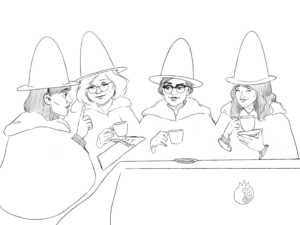My mom likes to tell this story about a time when she was misbehaving as a teenager. My grandma, her mother, looked her square in the eye and delivered the infamous Mom Curse — “Someday, I hope you have a daughter that is just like you.” Years later, as my sister and I entered our adolescence, she’d say the same thing to us, and follow it up with a quick “oh my god — I just opened my mouth and out came the voice of my mother.”
Sons chase after their fathers’ legacies, but daughters struggle to escape their mothers’ legacies. Sons go on quests to prove they can live up to their father’s name; daughters learn that maybe mothers, too, believed the world was full of possibilities before the drudgery of adulthood (and motherhood) stole them away. Mother/daughter stories are often focused on one singular womanhood, and making peace with the inevitability with which it will descend upon you, all wrapped up in a saccharine, feel-good package where maybe both parties learn from each other before the credits roll.
Make no mistake: daughters become their mothers in Jessica Jones Season 2 — but thankfully, without the feel-good affectation of so many other mother/daughter stories. Jessica Jones presents us with two mother/daughter relationships full of fraught, complex emotional detritus that can’t or won’t ever resolve neatly.
A lot of critics have justifiably taken Season 2 of Jessica Jones to task for the way it trivializes and fails to develop the roles of women of color and the ways the people of color it introduces are let down by the narrative. One aspect of this season that didn’t disappoint, however, is the way Jessica Jones Season 2 grapples with the relationships between mothers and daughters — giving us messy, imperfect mothers, morally suspect daughters, and an uneasy peace between the two.
This article contains a lot of spoilers for Jessica Jones Seasons 1 and 2.
Dorothy & Trish

Longtime Jessica Jones viewers should be familiar with Trish and Dorothy Walker. Dorothy, the human manifestation of the r/raisedbynarcissists subreddit, has been pushing Trish around her whole life, trivializing her passions, and leveraging her career for free booze since the beginning of the show’s first season. Few viewers will find anything redeeming to say about Dorothy — she’s cruel, manipulative, petty, and a tacky “cool mom, not a regular mom” stereotype.
I’m not going to argue that Dorothy pushes Trish to greatness because of her sacrifices as a single mother, or that Dorothy isn’t an irredeemable douchebag because she always turns up to help her daughter through life-threatening danger. That’s what mothers are supposed to do. That’s an integral part of mom-ing.
But after Trish’s ill-advised attempts to become a superhero go awry, Dorothy offers her comatose daughter a rare moment of praise, saying that Trish is everything she wanted to be, but better. Dorothy wants the best for her daughter — but because of her inability to empathize, she doesn’t stop to think about how her pushing and prodding and manipulating have taught Trish that leveraging your physical health and all of your loved ones for success is an acceptable sacrifice.
After spending an entire season cheering Trish on for cutting her toxic mother out of her life, Season 2 immediately confronts us with their secret, slow-building reunion. Dorothy continually refuses to use Trish’s preferred name and negs her professional ambitions and accomplishments. Through the contrast between flashbacks to Trish’s early 20s Miley Cyrus years, we see Dorothy’s willingness to benefit from Trish’s drug-addicted burnout, as well as her entitlement over what she thinks Jessica owes her for years she took her in.
So once present-day Trish starts treating Malcolm and Jessica like useful tools to get what she wants (sex, drugs, a juicy story for her dream news job, etc), we see that pattern repeat itself. Trish wants abilities that make her even more extraordinary than she already is. She wants the spotlight. She wants the adoration. And deep down, she doesn’t care which loved one is the collateral damage in her story.
Alisa & Jessica

Once Jessica learns that her long-dead mother is not only alive, but is a superpowered, bloodrage-fueled murder machine, she has to contend with layers of emotional whiplash while trying to sub in for Alisa’s missing conscience — a lot of pressure for somebody who thought she was an orphan for 17 years.
Unlike Dorothy, Alisa is willing and eager to jump headlong into mom-ing again. She beams with pride over Jessica’s independence and takes an interest in the person her daughter has become. In the season’s arguably most poignant scene, Alisa works to dispel the grief and blame Jessica has been carrying around since her parents died. Outside of, you know, all the bloodrage, Alisa absorbs Jessica’s angry barbs, accepting responsibility in ways Dorothy never would. In a lot of ways, Alisa offers Jessica the chance to get the mom she’s needed for almost two decades.
But, again, Alisa murdered several innocent people in order to protect her dadwave supervillain boyfriend. She didn’t just kill these people in the heat of the moment — she enacted meticulously detailed plans to remove the human obstacles in her way and to make their deaths seem like accidents. She quietly dug herself out of a cement-lined basement. So, maybe Alisa isn’t getting any mother-of-the-year awards for braining Jessica’s skeevy college ex or charming her new boyfriend by complimenting his watercolors.
Jessica’s fear of turning into Alisa is an immediate and obvious theme throughout the latter half of the season — much less subtle than the cycle of emotional abuse turning Trish into Dorothy. Both Jessica and Alisa struggle with anger, grief, and a terrible strength they can’t always control. Both received that strength from the same source. Even before Alisa re-enters her life, Jessica starts Season 2 struggling with her public persona as a vigilante after taking out Kilgrave in the Season 1 finale. So Alisa’s voice is just one of several encouraging Jessica to take that leap into justifying murder. Once Jessica does take that next step — taking a life for the second time — she questions whether or not the rage fueling Alisa is an inevitable, unstoppable force within herself as well.
We also see the positive qualities Alisa instilled in her daughter. As Jessica and Alisa bond over booze, hardship, and a Very Thematic mother/daughter roadtrip, we see how Alisa’s independence probably molded Jessica into the self-determined woman she eventually became, long before the accident and the superpowers. We watch them share coping devices and influence each other.
But unlike those saccharine mother/daughter stories where both parties reach an understanding, Jessica doesn’t learn to emulate her mother — she learns that her mother is a flawed, struggling person; she learns that she can’t separate Alisa, Loving Mother of Jessica Jones from Alisa, A Remorseless Murderer or Alisa, Woman in an Unhealthy Marriage or even Alisa, Woman in Love. We can understand why Jessica might never be able to forgive Alisa for the things she’s done, but we can also understand why she loves her mom anyway. And that complexity is what makes Jessica Jones Season 2 so compelling. There’s no easy answer to how Jessica should feel about Alisa, and no easy answer as to why Trish keeps taking Dorothy’s calls.
Maybe we feel doomed to become our mothers because they teach us how to handle so much of the bullshit we’ll encounter throughout our lives. Some of the ways our moms teach us to handle that bullshit are healthy, but sometimes our moms teach us the same unhealthy coping mechanisms their moms taught them. Maybe none of us ever really become our moms — we’re all just doing the best with the tools our moms gave us. But as Jessica learns throughout Jessica Jones Season 2, we can choose whether or not to make the same mistakes our moms made — and even if we do, it’s in our power to decide whether or not we’ll keep making them over and over again.
Whether we talk to our moms every day or screen our calls to avoid talking to them, our moms still have a huge emotional impact on us. Jessica Jones Season 2 uses all the complicated feelings between mothers and daughters to explore the Marvel Universe’s biggest dilemmas more deftly than its MCU counterparts on the big big screen. Jessica’s indecision over whether or not she should hand her mother over to a prison for powered individuals stripped of their legal rights adds gravity to the “how much can we regulate superpowers” debate more than any mega ultimate team-up in Marvel Civil War ever could. But maybe that’s just because our real questions about our relationships with our moms are heavier than libertarian subtext-laden hypotheticals. Jessica Jones succeeds at posing these questions because it makes them personal, real. We’re not watching Jessica decide whether her genetically engineered mom should go to villain jail — we’re watching her struggle through what both of them owe to each other.
All images sourced from Netflix’s Jessica Jones Season 2.




